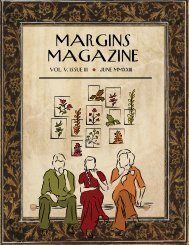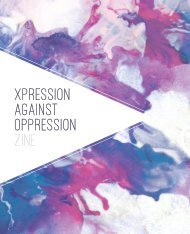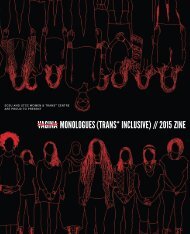Create successful ePaper yourself
Turn your PDF publications into a flip-book with our unique Google optimized e-Paper software.
VOL. IV | ISSUE IV<br />
MARGINS<br />
IN CONVERSATION<br />
WITH:<br />
ANJUM SULTANA<br />
by Farah Ahmad<br />
I had the opportunity to chat with Anjum Sultana, an award-winning public policy<br />
and communications specialist. In this interview, we spoke about her work on<br />
the Feminist Economic Recovery Plan and she gave us some insight on policy recommendations<br />
to address the inequalities faced by women during the COVID-19<br />
pandemic.<br />
Anjum Sultana is a policy professional based in Toronto, Ontario. Anjum holds an<br />
Honours Bachelor of Sciences in Health Studies, Psychology and Neuroscience from<br />
the University of Toronto as well as a Masters of Public Health from the Dalla Lana<br />
School of Public Health. Throughout her career, she has been passionate about<br />
the intersection of public health, human rights and social determinants of health,<br />
focusing on the health and wellbeing of marginalized communities.<br />
In 2020, Anjum was named Global Women of Distinction by the NGO Committee on<br />
the Status of Women. She will be honoured before the 64th session of the United<br />
Nations Commission on the Status of Women.<br />
She currently serves as the National Director of Policy & Strategic Communications<br />
at YWCA Canada, which is the largest women’s multi-service organization in<br />
Canada. Anjum is recognized by Progress Toronto as an inclusive city builder and<br />
a principled supporter of progressive policies to make our city a healthier, happier<br />
and more equitable place to be.<br />
The Feminist Economic Recovery plan was put forward by YWCA Canada and the<br />
Institute for Gender and the Economy at the University of Toronto’s Rotman School<br />
of Management. The plan proposes a new path for the Canadian economy in light<br />
of the COVID-19 pandemic, one that focuses on changing the structure and barriers<br />
that have made some groups more vulnerable to the pandemic and all its fallouts.<br />
This plan discusses a variety of policy recommendations centred around 8 pillars<br />
for recovery that focus on supporting the care economy, investment into social<br />
infrastructures and supporting women-owned businesses.<br />
TW: domestic abuse, COVID-19<br />
FA: Thank you so much for taking the time<br />
to meet with me to talk a bit about the<br />
Feminist Economic Recovery Plan. Before<br />
we start, could you tell us a little bit about<br />
yourself?<br />
AS: My name is Anjum Sultana. Currently, I<br />
serve as the National Director of Public Policy<br />
and Strategic Communications at YWCA.<br />
Before I came to the role here, I spent a lot of<br />
my early part of my career in health equity<br />
and public health. Following my degree at<br />
the University of Toronto Scarborough, I did<br />
a master’s in public health. As I was doing<br />
[my master’s] I had worked internationally,<br />
then also worked in Toronto, – in doing so<br />
I was seeing work around issues related to<br />
immigration, refugees, and migration. That<br />
was a place where I could bring my global<br />
health interest as well as my interest in urban<br />
health equity to the City of Toronto.<br />
And so, right after my master’s, I did a fellowship<br />
at the Wellesley Institute which is a<br />
think tank that focuses on the social determinants<br />
of health and how that can be an<br />
avenue to teaching health equity. I was working<br />
on issues related to housing and employment<br />
and training programs, all looking at<br />
it through an equity lens and also looking<br />
at things like citizenship - for example, how<br />
is that a health equity issue. Whether or not<br />
you’re a citizen has a determination of if you<br />
can vote. And as we saw, you know, earlier<br />
this week, right, elections are very consequential.<br />
So who can and can’t participate<br />
in democracy matters for our well-being in<br />
a broader, more holistic way.<br />
Fast forward a couple of years, an opportunity<br />
came up at YWCA Canada. Throughout<br />
my career, I did a lot of research and analysis,<br />
but I was hungry for how to take that and put<br />
it into action into that public policy space,<br />
and I got a taste of that at Wellesley. So when<br />
this role came up, I was excited and now I’m<br />
leading this work, and doing this through a<br />
pan-Canadian lens, advancing gender equity,<br />
and looking at the same issues I was looking<br />
at Wellesley like housing, employment &<br />
income security, but through a gender lens<br />
now.<br />
FA: Awesome. That’s great. And that sort<br />
of feeds into my next question. I was wondering<br />
if you could tell me a little bit more<br />
about the YWCA?<br />
AS: Yeah, so YWCA Canada is the nation’s<br />
largest and oldest gender equity organization.<br />
So that means we’ve experienced multiple<br />
pandemics and multiple types of emergency<br />
situations. When COVID hit and when,<br />
on March 11, the World Health Organization<br />
called it a pandemic, even before that date,<br />
YWCAs across the country were mobilizing.<br />
We have 31 YWCAs that work in 300 communities<br />
across the country and in real-time,<br />
they are seeing the devastation of this pandemic,<br />
not only on health, and well-being like<br />
physical health and mental health, but also<br />
the devastation on the economic well-being<br />
and social infrastructure. We were seeing<br />
this happen across the country, we were<br />
stepping up and taking action. At the same<br />
time, we were also realizing again what we<br />
were fighting for before the pandemic is even<br />
more important.<br />
We need universal child care because we<br />
saw how the absence of child care grinds the<br />
economy. We saw gender-based violence and<br />
we have been calling for a national action<br />
plan regarding gender-based violence. But<br />
in the pandemic, we saw gender-based violence<br />
increase, and how, because of the lack<br />
of coordination and participation of different<br />
sectors of society, people are falling through<br />
the cracks. Similarly, our income security<br />
programs are insufficient and inadequate for<br />
the needs of the communities that we serve.<br />
So again, this is another place where we need<br />
to see policy action. Realizing that these challenges<br />
were happening on the ground across<br />
the country, we put forward a pan-Canadian<br />
policy report, talking about recovery through<br />
12<br />
13
















